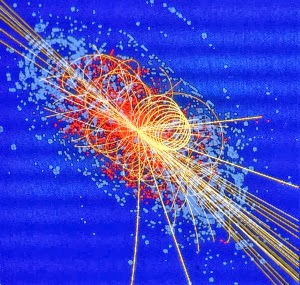 |
| The Higgs boson may have played a key role in the early Universe, including the creation of mysterious dark matter. CERN |
A key riddle in cosmology may be answered by the 2012 discovery of the Higgs boson — now a leading contender for the 2013 Nobel Prize in Physics on 8 October.
Two physicists suggest that the Higgs had a key role in the early Universe, producing the observed difference between the number of matter and antimatter particles and determining the density of the mysterious dark matter that makes up five-sixths of the matter in the Universe.
In a paper accepted for publication in Physical Review Letters [1], Sean Tulin of the University of Michigan in Ann Arbor and Géraldine Servant of the Catalan Institute for Research and Advanced Study in Barcelona, Spain, say that there may have been an asymmetry in the early Universe between the Higgs boson and its antimatter counterpart, the anti-Higgs.
Comments